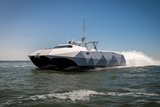Airbus to define next generation of European military helicopters
Airbus Helicopters will lead a study on European military rotorcraft needs beyond 2030. (Photo: Airbus Helicopters)
Airbus has been contracted to coordinate two defence R&D projects under the European Defence Fund (EDF) initiative's 2021 funding round.
Among the 61 collaborative defence R&T and R&D projects that were selected last year and funded with €1.2 billion, Airbus Helicopters is coordinating the EU Next Generation Rotorcraft Technologies Project (ENGRT), while Airbus Defence and Space is leading the European Defence Operational Collaborative Cloud (EDOCC) effort.
Contracts for these projects were signed in December 2022.
Related Articles
NATO member states join forces to multiply defence R&D
DARPA strives for the future helicopter pilot
Airbus joins UK efforts to defend against hypersonic threats
ENGRT will focus on analysing and understanding needs of European armed forces for rotorcraft operations after 2030. The project's partners will study concepts of operations and define technologies needed for future military rotorcraft. Alternative aircraft concepts and architectures will be explored, and this project will 'pave the way for the next generation of military rotorcraft in Europe', according to Airbus.
The EDOCC meanwhile will create a virtual platform to increase interoperability, efficiency and resiliency of military operations, strengthening collaborative services on the battlefield. The project will study, design and validate a virtual platform and develop a services catalogue while identifying standards and technologies for greater interoperability.
Related Programmes in Defence Insight
EU Next Generation Rotorcraft Technologies Project (ENGRT) - [COUNTRY]
More from Defence Notes
-
![High tension in the High North – a wake-up call for NATO’s future Arctic defence efforts?]()
High tension in the High North – a wake-up call for NATO’s future Arctic defence efforts?
Any potential ‘Arctic Sentry’ mission would be months in the planning, but with tensions high in the region given the US’s push for Greenland, NATO countries will need to continue to emphasise their commitment to the region, analysts have said.
-
![Venezuela prepares personnel and equipment for a potential second US attack]()
Venezuela prepares personnel and equipment for a potential second US attack
Defence Minister Gen Vladimir Padrino López has declared that the Venezuelan armed forces “will continue to employ all its available capabilities for military defence”.
-
![As the new year starts, the UK defence spending delay continues]()
As the new year starts, the UK defence spending delay continues
The UK’s defence spending commitments remain uncertain as the government’s Defence Investment Plan, which had been due by the end of 2025, is yet to be published.
-
![How might European countries look to tackle drone incursions?]()
How might European countries look to tackle drone incursions?
Disruption of infrastructure in Europe, whether by cyberattack, physical damage to pipelines or uncrewed aerial vehicles flying over major airports, as has happened more recently, is on the rise. What is the most effective way of countering the aerial aspect of this not-so-open warfare?
-
![Taiwan approved for $11 billion weapon purchase from US]()
Taiwan approved for $11 billion weapon purchase from US
The US State Department’s approval of a multi-billion-dollar sale of weapons to Taiwan includes tactical mission networks equipment, uncrewed aerial systems, artillery rocket systems and self-propelled howitzers as well as anti-tank guided missiles.
-
![Ireland spells out $2.3 billion shopping list in five-year defence spending plan]()
Ireland spells out $2.3 billion shopping list in five-year defence spending plan
Ireland’s multi-annual investment in capital defence spending is set to rise from €300m in 2026 to €360m in 2029–2030 with major upgrades across land, air, maritime and cyber domains.


























